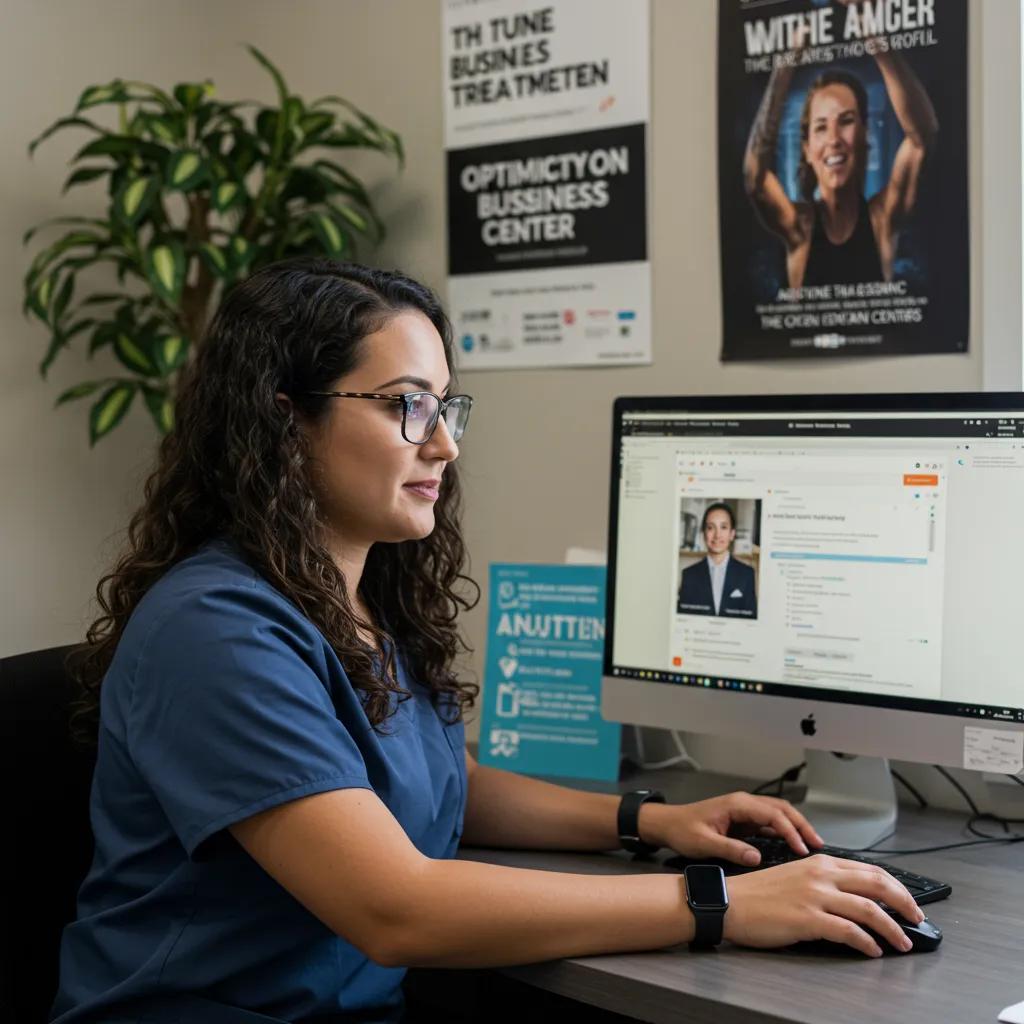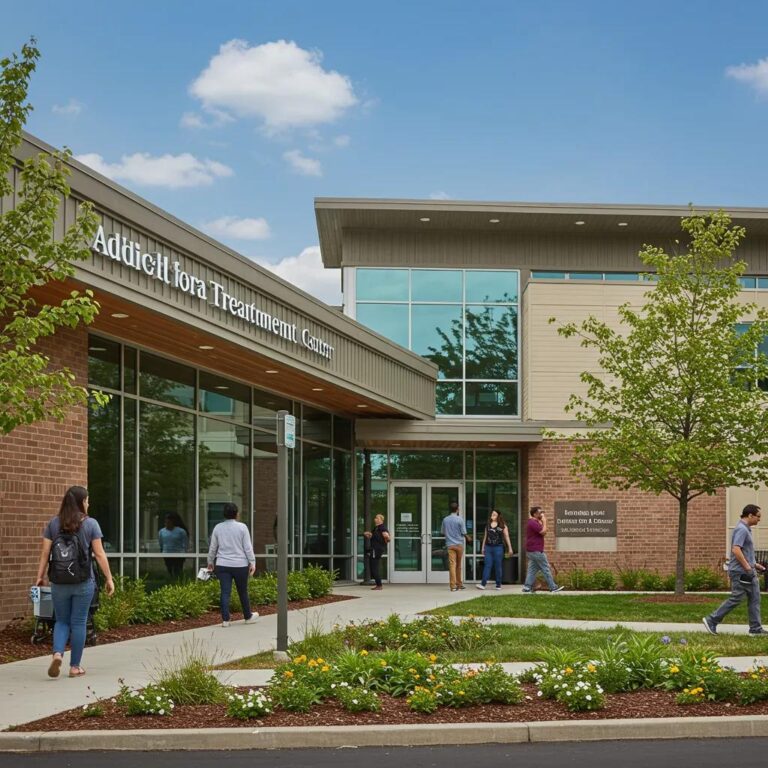Local SEO for Addiction Treatment Centres: How to Boost Local Visibility and Patient Admissions
A focused local SEO strategy transforms an addiction treatment centre’s online presence into a magnet for nearby patients by aligning digital signals with local search intent. With 88% of patients who search for a local healthcare provider visiting or calling within 24 hours, Recovery Path Marketing leverages AI-powered local SEO to drive measurable increases in calls and admissions. This guide demonstrates how treatment centre local SEO enhances visibility, from Google Business Profile optimisation and keyword research to on-page technical improvements, off-page authority building, performance measurement and ethical compliance.
What Is Local SEO for Addiction Treatment and Why Does It Matter?
Local SEO for addiction treatment is a specialised digital marketing approach that optimises an inpatient or outpatient rehab centre’s visibility in geographically focused searches. By improving location signals, citation consistency and on-page relevance, a rehab local SEO strategy ensures that potential patients find recovery services when they search “addiction treatment near me” or similar queries, leading to higher call rates and admissions. This foundational concept underpins every subsequent tactic, from Google Business Profile enhancements to local citation building.
How Does Local SEO Improve Visibility for Rehab Centres?
Local SEO improves visibility for rehab centres by aligning site and profile information with geo-specific search algorithms. It achieves this through:
- Accurate NAP entries that reinforce proximity signals.
- Structured local schema markup that clarifies service areas.
- Optimised Google Business Profile fields that boost local pack rankings.
These components work together to raise a centre’s placement in map listings and local SERPs. Consistent location data and schema support domain trust, leading directly into why local search is critical for patient acquisition.
Why Is Local Search Critical for Addiction Treatment Facilities?
Local search is critical because most patients begin their recovery journey with geographically relevant queries and choose nearby providers. A rehab’s ability to appear in the Google local pack and maps increases call volumes by up to 50% within six months. Leveraging local search aligns service availability with patient urgency, reduces acquisition costs and maximises program occupancy. This reliance on proximity-based discovery highlights the key benefits of local SEO for addiction recovery services.
SEO for Hospital Websites: Improving Online Visibility for Healthcare Providers
As the primary providers of healthcare, hospitals are expected to disseminate health information to the public, making their website visibility in search engines crucial. This paper investigates
Search engine optimization (SEO) approach in studying information demand and supply: methodology of Geo-Targeted keywords with case study of hospital websites …, ATW Yudasubrata, 2019
What Are the Key Benefits of Local SEO for Addiction Recovery Services?
Local SEO delivers three primary benefits for addiction recovery services:
- Enhanced patient acquisition through map-pack visibility.
- Improved trust signals via consistent reviews and accurate profiles.
- Higher conversion rates by matching search intent with location-specific content.
By investment in treatment centre local SEO, facilities strengthen community reach and support long-term growth, setting the stage for Google Business Profile optimisation.
How Do You Optimise Your Google Business Profile for Addiction Treatment Centres?

Optimising a Google Business Profile (GBP) for addiction treatment centres involves claiming the profile, verifying location data and enriching entries with services, photos and patient reviews. This process enhances local pack eligibility and drives patient engagement.
What Are the Steps to Claim and Verify Your Rehab Centre’s GBP?
To claim and verify a rehab centre’s GBP:
- Request ownership through Business Profile Manager using centre credentials.
- Confirm address via mailed postcard or Google Search Console verification.
- Complete verification by entering the PIN and reviewing business information.
Accurate verification cements the centre’s presence on Google Maps and is the prerequisite for category and service optimisation.
How to Choose the Best GBP Categories and Services for Addiction Clinics?
Selecting appropriate GBP categories and services ensures that Google associates a centre with relevant recovery programmes. Primary category “Addiction Treatment Centre” should be supplemented by services such as “Outpatient Alcohol Rehabilitation” or “Inpatient Drug Rehab.” This categorisation clarifies treatment offerings, improves search alignment and enhances local relevance.
How Can You Generate and Manage Online Reviews for Rehab Centres?
Capturing and managing patient testimonials involves:
- Encouraging post-treatment reviews via email prompts and on-site kiosks.
- Responding promptly to feedback to demonstrate care and build trust.
- Highlighting high-impact testimonials on website location pages.
Effective review management increases average star ratings and boosts ‘addiction local SEO’ authority in Google’s algorithms.
How Do GBP Posts and Q&A Features Enhance Local Engagement?
Regular GBP posts announce new programmes, success stories and events to local audiences, while the Q&A feature allows centres to address common patient concerns directly. These interactive elements signal activity to Google, encourage clicks and improve user trust, bridging to local keyword strategies that capture broader search intent.
What Are the Best Local Keyword Strategies for Addiction Treatment SEO?

An effective local keyword strategy combines broad service terms with geo-modifiers and conversational queries to capture intent at each patient journey stage. This ensures rehab local SEO covers discovery, consideration and conversion keywords.
How to Conduct Local Keyword Research for Rehab Centres?
Local keyword research for rehab centres entails:
- Compiling base terms like “drug rehab”, “alcohol detox” and “addiction counselling.”
- Adding geo-modifiers such as city, county or postcode to target proximity searches.
- Using AI-driven tools to identify high-volume conversational queries like “how to find local addiction help.”
This research informs content and GBP fields, optimising for patient-centric queries and leading into selection of long-tail terms.
Local SEO for Retailers: Enhancing Visibility and Organic Traffic
Search Engine Optimisation (SEO) enhances a business’s online visibility relative to its priority competitors, fostering improved communication and interaction in response to the diverse demands of online consumers. SEO is particularly crucial for the success of retail businesses, which are characterised by constant short-term and long-term strategic decisions. The objective of this research is to substantiate the significance of local search engine optimisation for retailers to augment organic traffic; to present insights and provide practical recommendations for retailers concerning the local optimisation of their businesses within Google as an integral component of an effective marketing strategy; and to develop typical, valid data micromarking (using the example of a Ukrainian retailer) that will facilitate advantageous placement within the Local Pack compared to competitors, thereby increasing organic traffic and conversion rates.
Business optimization in the digital age: Insights and recommendations, A Natorina, 2020
Which Long-Tail and Conversational Keywords Drive Addiction Recovery Searches?
Long-tail and conversational keywords capture nuanced patient needs, for example:
| Keyword Example | Intent Stage | Conversion Benefit |
|---|---|---|
| “best inpatient rehab centres in Bristol” | Decision | Targets committed patients |
| “affordable alcohol detox near me” | Consideration | Matches budget-conscious users |
| “how to start outpatient addiction treatment” | Discovery | Educates and guides engagement |
Incorporating these phrases across service pages and GBP posts boosts relevance and local visibility.
How to Map Keywords to Patient Search Intent and Journey Stages?
Mapping keywords to the patient journey involves categorising terms by informational, navigational and transactional intent. For instance, “signs of alcohol addiction” (informational) appears in blog content, while “detox clinic Bristol phone” (transactional) is featured on location landing pages, ensuring that each search triggers the most relevant page and service offering.
How to Optimise On-Page and Technical SEO for Local Addiction Treatment Websites?
On-page and technical SEO for local addiction treatment websites focuses on location-specific pages, consistent NAP data, schema markup, mobile usability and performance optimisation. These elements combine to deliver fast, relevant experiences to patients and local search engines.
Why Are Location-Specific Landing Pages Essential for Rehab Centres?
Location-specific landing pages define services offered in each area, combine geo-targeted keywords and showcase local testimonials.
| Landing Page | Target Coverage | Conversion Impact |
|---|---|---|
| “Somerset Inpatient Rehab” | Somerset, UK | Improves calls from local searches |
| “Bath Alcohol Detox Services” | Bath, UK | Increases form submissions |
| “Outpatient Addiction Counselling Bristol” | Bristol, UK | Engages ongoing care patients |
These pages sharpen relevance for local searches and directly support higher conversion rates.
How to Ensure NAP Consistency and Implement Local Schema Markup?
Maintaining identical Name, Address, Phone (NAP) information across website, GBP and citations is crucial. Implementing LocalBusiness schema with properties such as , and clarifies service boundaries. Consistent NAP data strengthens trust signals and improves local ranking factors.
What Role Do Mobile-Friendliness and Site Speed Play in Local SEO?
Mobile-friendliness and fast load times reduce bounce rates and signal quality to Google. A responsive design combined with accelerated mobile pages ensures that on-the-go searches for “rehab near me” convert efficiently, while Core Web Vitals optimisation solidifies rankings in local pack results.
How to Optimise Content for Local Search Intent in Addiction Treatment?
Optimising content for local search intent involves weaving geo-modifiers into headings, service descriptions and patient success stories. Emphasising community partnerships and local outcomes increases relevance. Tailoring FAQs and programme details to specific regional concerns completes the on-page optimisation cycle and transitions naturally into off-page authority building.
How Can Addiction Treatment Centres Build Local Authority and Off-Page SEO?
Building local authority and off-page SEO for addiction treatment centres involves high-quality citations, community-driven link building and reputation management. These tactics establish trust and reinforce geographic relevance.
What Are Effective Local Citation and Directory Listing Strategies?
Local citation strategies focus on ensuring NAP consistency across reputable healthcare directories, local chambers of commerce and specialist rehab listings. High-authority citations increase domain trust and improve geographic relevance in search algorithms.
Digital Marketing Strategies for Healthcare Clinics: Search Engine Optimisation and Patient Retention
The findings revealed that healthcare clinics increasingly rely on digital marketing tools such as Search Engine Optimisation, Pay-Per-Click advertising, content marketing, social media engagement, and email automation to improve visibility and patient retention. Additionally,
Digital marketing transformation in healthcare clinics: strategies, challenges, and patient engagement outcomes, 2025
How to Develop Local Link Building Through Community Partnerships?
Forging partnerships with community organisations, local support groups and healthcare providers generates contextually relevant backlinks. Collaborative events, educational seminars and sponsorships provide natural link opportunities that bolster a centre’s off-page authority in local ecosystems.
How to Manage Online Reputation and Patient Testimonials for Trust?
Proactively curating patient testimonials on both GBP and the centre’s website showcases aggregateRating information. Responding to feedback, highlighting success metrics and emphasising transparent care pathways build trust signals that influence prospective patient decisions and underpin ongoing reputation management.
How Do You Measure and Adapt Local SEO Success for Addiction Treatment Centres?
Measuring and adapting local SEO success requires tracking entity-focused KPIs, leveraging specialised tools and continuously refining strategies based on performance data.
What Are the Key Performance Indicators (KPIs) for Local SEO in Rehab Marketing?
Key KPIs include:
- Local pack ranking positions for target keywords.
- Google Business Profile views, clicks and direction requests.
- Volume and sentiment of online reviews.
- Organic traffic to location-specific pages.
- Conversion events such as form submissions and phone calls.
Monitoring these metrics reveals opportunities for iterative improvements.
Which Tools Help Track Local Search Rankings and Google Business Profile Insights?
Local SEO tracking tools such as BrightLocal and Moz Local audit citation consistency, while Google Business Profile Insights and Google Search Console report on profile interactions and keyword performance. Combining these platforms provides a holistic view of local search effectiveness.
How to Continuously Monitor and Adjust Local SEO Strategies for Better Results?
Continuous monitoring involves monthly audits of citation accuracy, weekly review of GBP performance and quarterly content refreshes to incorporate new long-tail queries. Adaptive strategies, informed by AI-driven analytics, ensure that rehab local SEO remains aligned with evolving patient search behaviours and algorithm updates.
What Ethical and Compliance Considerations Affect Local SEO for Addiction Treatment?
Ethical and compliance considerations guide every stage of local SEO for addiction treatment, ensuring that marketing practices adhere to healthcare regulations and build patient trust.
How Do HIPAA and YMYL Guidelines Impact Addiction Treatment SEO?
HIPAA and Google’s YMYL criteria require the protection of patient data and transparent representation of medical claims. All content, from blog posts to GBP responses, must avoid misleading health information, maintain privacy standards and cite reputable sources to satisfy regulatory and algorithmic scrutiny.
What Are Best Practices for Ethical SEO in Healthcare Marketing?
Ethical SEO practices include using only patient-approved testimonials, avoiding sensationalised health claims and ensuring that all service descriptions reflect actual clinical offerings. Full disclosure of treatment modalities and transparent pricing information reinforce credibility and compliance.
How to Build Trust Through Transparent and Compliant Local SEO Practices?
Trust is built by publishing detailed programme outlines, secure contact forms, clear privacy policies and verified patient success metrics. When local SEO emphasises transparency, patients feel confident in their decision, and search engines reward the centre with stronger authority signals and stable rankings.
Local SEO for addiction treatment combines precise technical work, community engagement and ethical marketing to drive sustainable admissions growth. By implementing these strategies, centres strengthen local visibility, enhance patient trust and secure a leading position in competitive local markets.





